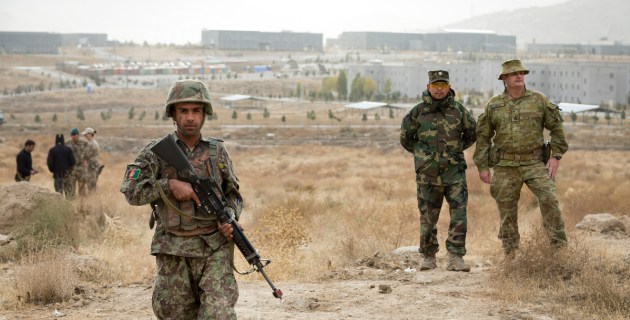ASPI complicit in US and Australia's Afghanistan deceit
September 12, 2021
T_he Taliban victory in Afghanistan and the ensuing debacle of the Western withdrawal from Kabul was always going to test the conscience of the Australian Strategic Policy Institute (ASPI)._
Its vanity made the confrontation inescapable, as did the fact that its funding, in any normal universe is, or should be, inextricably linked to the quality of its product. When the quality of that product, or the lack of it, is patent, two options present themselves: confess to error, or brazenly imply that the product was faultless all along.
ASPI has chosen the latter.
The vanity needs a second look, for two reasons. First, it is ASPIs boast, against which it must be judged, that it is an independent, non-partisan think tank that produces expert and timely advice for Australian and global leaders. ASPI generates new ideas for policy makers, allowing them to make better-informed decisions. ASPI is one of the most authoritative and widely quoted contributors to public discussion of strategic policy issues in the Indo-Pacific region and a recognised and authoritative Australian voice….
The second is that ASPI is institutionally neurotic. For a place which is 67 per cent funded by the Department of Defence and federal government agencies, 20 per cent in total by Defence industries and overseas government agencies, and 11 per cent by the private sector, it is seemingly obsessed with interpreting itself and explaining itself and its record in both long and short forms of it various publications. In most organisations this would be considered an expensive form of Obsessive Compulsive Disorder, but clearly the largesse it receives from its funding sources are sufficient to cover the costs of therapy.
What the recent developments in Afghanistan have brought forth are ASPIs crises of faith and credibility, the former relating to the alliance with the United States, the latter to the integrity and quality of its expert and timely advice".
These crises present as follows:
In the first instance, significant strategic difficulties are held to be foretold in a retrospective survey of certain ASPI reports on the Australian Defence Forces (ADF) deployment; crucially, neither defeat nor debacle, let alone both, contemplated. Within the very small sample of offerings between 2006 and 2009, the inference is that ASPIs vision was clear and its conclusions, on offer to government, were sober. Indeed, various citations indicate that the Australian government was attuned to the problematic nature of the ADFs mission. Harmony was the condition among Canberras expert community.
Progressively, as the war in Afghanistan became a state-building project, misgivings about strategic incoherence (nation-building v counter-insurgency) and the lack of overall success of the missions appear in various publications. In context, these overshadowed the ADFs successes in the form of effective training of the 4th Brigade of Afghan National Army and the degrading of the insurgent forces in Uruzgan Province. A reprise of Vietnam? Australia, left to itself, achieves its objectives; the faults lie with others, elsewhere.
Suggestively, these relate to early US assessments that the Afghanistan situation was containable a judgement mocked by longstanding and publicly available contrary social, political, economic, religious and geo-strategic indicators and the evident and deliberate dishonesty of US administrations in their accounts of the war by no later than 2009.
The second manifestation of crisis takes the form of alarmist and hysterical denunciations by ASPIs executive director. Reduced to its key elements, current US strategy and policy now enshrine incoherence, deceit, dishonesty, and unreliability; moreover, they constitute a betrayal of its allies and friends on a global scale.
Worse, they are the result of strategic panic rather than deliberation, and are formulated by what, in another era, David Halberstam described as the best and the brightest: gutless Ivy League technocrats responsible for the greatest foreign policy disaster since the invasion of Iraq.
President Joe Biden, as commander-in-chief of this fiasco, and his administration, lack courage in the face of a challenge from a few thousand grimy Taliban fighters with AK-47s and Toyotas, has opened up the world to Russias and Chinas ambitions and terrorist organisations of all stripes because, matching the defaults of the administration are army and marine corps that are substantially a broken force.
Conclusion: Americas allies in general, and Australia in particular, have to substantially strengthen their defence capabilities in order to be seen potentially at least worthy of US support and to again potentially ensure that the US remains committed to Australias security.
There it is: in the face of what is described as American perfidy and, paradoxically, a sound argument to terminate the alliance, the resolution of the crisis is to recommit to perfidious America.
How could it be otherwise for an organisation ordered on cognitive dissonance? Despite the fact that the US debacle, defeat, and humiliation were encompassed by grimy fighters not in possession of the high-tech instruments of detection and destruction produced by, inter alia, ASPIs benefactors, the need to evade an existential meltdown is paramount.
And evasion is the objective: if the situation was as problematic as ASPIs reports make out, then it was imperative that the institute emphasise, repeatedly, that Australias mission was imperilled. Since there is no evidence of this cited, the inference is that ASPI went along with a doomed policy which, when when it eventually failed, required it to resort to an apologia marked by selective amnesia, a casuistic selection of historical evidence, and rosary-like incantations of the alliance.
To hand, therefore, is an unambiguous example of the perfect coincidence of expert advice and cupidity. If ASPI admits that its understanding of Afghanistan was fundamentally wrong, or correct but inadequately communicated, then it disqualifies itself from both its boasts and being taken seriously by its patrons.
Far better, then, to lay the blame for failure on the aberrant rise of pusillanimous decision makers in Washington DC, and then recommend that the future will be better secured though a disposition to war reinforced by procuring even more of the sponsors fine products.
If this exercise in self-regard requires a great deal to be repressed and it does so be it. In fact the scale of omissions, misrepresentations, and outright contradictions in this moment of attempted exculpation are not only many but extraordinary.
To begin, the post-2005 mission of nation-building Afghanistan into a secular, multi-party polity along Western lines with a market economy is more accurately defined as an imperial fantasy which took too little account of the actually existing determinants of political power and influence.
The almost certain failure of it all could be, and was, predicted by scholars and experts of standing independent of the think tanks and intelligence agencies. In any case, a single question should have been sufficient to abort it at inception: where has the US ever succeeded in such mission?
The answer in the negative provides perspective on the contempt for the polished Ivy League technocrats who lack grit and authored Bidens Afghanistan strategy. Yes inside the Beltway, the Ivy League has been prominent but the time for denunciation is before the event, not at its denouement. Besides, it’s futile. If the Ivy League is the problem, then most, virtually all, administrations are not to be trusted. They are always populated with its graduates. Might there not be a point in examining the song rather than the singer?
Similarly, the humiliation of recent weeks by grimy, largely illiterate soldiers from the hinterland would not have come as a surprise if the lessons of the military history of Afghanistan had been understood; more, there would have been no surprise if the trend lines of the country as the related to all spheres of life - social, political-economic, ethnic, religious, military and geo-strategic were factored in with appropriate significance.
These factors and their likely influence on outcomes were discoverable on the public record in accounts by individuals and organisations which had demonstrated a sustained, intelligent, and critical interest in the country. What they pointed to were embedded systemic conditions which, historically and invariably, were inimical to accomplishing the mission.
From the early 2000s Afghanistan was governed by a broad-based criminal cartel, eventually so vast in its extent that it reached down into all aspects of everyday life for Afghanis, both military and civilian; part of it the drug trade was a multinational enterprise. Its operations, moreover, were safe and secure so long as the US and its allies continued to prop it up which, strategically, they felt compelled to because 1) they lacked the means, and 2) for fear of creating even worse conditions.
This reality, and most significantly, its implications, therefore, had to be known to all interested parties: ASPI, the Australian government, and the ADF. Essentially, it was a chronic crisis which culminated in the acute crisis of last August.
What is especially disconcerting is that in parallel to the extended crisis, which evidence now demonstrates that successive US administrations accepted, the US and Australia talked up the prospects of success knowing that it was dishonest to do so. By extension, ASPIs refusals not to draw attention to this made it complicit in a policy of grand deceit. The transit was complete: from harmonious misgiving to harmonious dishonesty and incompetence.
Michael McKinley is a member of the Emeritus Faculty, the Australian National University; he taught Strategy, Diplomacy and International Conflict at the University of Western Australia and the ANU.

